How to Tell if Roast Beef Is Done in Crockpot
Goulash packed with tender beef and veggies swimming in a rich, paprika laced broth is a meal-in-one that will shoot to the top of everyone's favorite list!
Goulash is the original Hungarian comfort food and is utterly divine – my husband is obsessed! It's tasty, warm and hearty, perfect for the whole family! Hungarian Goulash is a beef soup with thicker versions referred to as Pörkölt. It features buttery tender, slow cooked beef, potatoes, onions and bell peppers in a rich and flavorful sweet paprika infused beef broth. This Goulash recipe is a complete meal-in-one made with humble ingredients that bakes all in one pot for an easy make-ahead dinner any night of the week (crockpot and stovetop versions included too). I've included step-by-step photos, tips and tricks to make the best Hungarian Goulash recipe of your life! Serve this Goulash recipe over csipetke, (or our American egg noodles) with a dollop of sour cream and a side of rye bread for the complete Goulash experience.
This Hungarian Goulash joins the ranks of my other beef recipes: Beef Stew, Beef Brisket, Beef Stroganoff, Beef Tips and Gravy, Italian Beef, Mississippi Pot Roast, French Dips etc. with melt-in-your mouth tender, richly satisfying beef. Check them all out here!
I'M GOING TO DETAIL GOULASH HISTORY, INGREDIENTS, VARIATIONS, AND TIPS FOR SUCCESS. YOU CAN READ ON OR USE MY "JUMP TO RECIPE" BUTTON AT THE TOP OF THE PAGE TO SKIP STRAIGHT TO THE RECIPE.
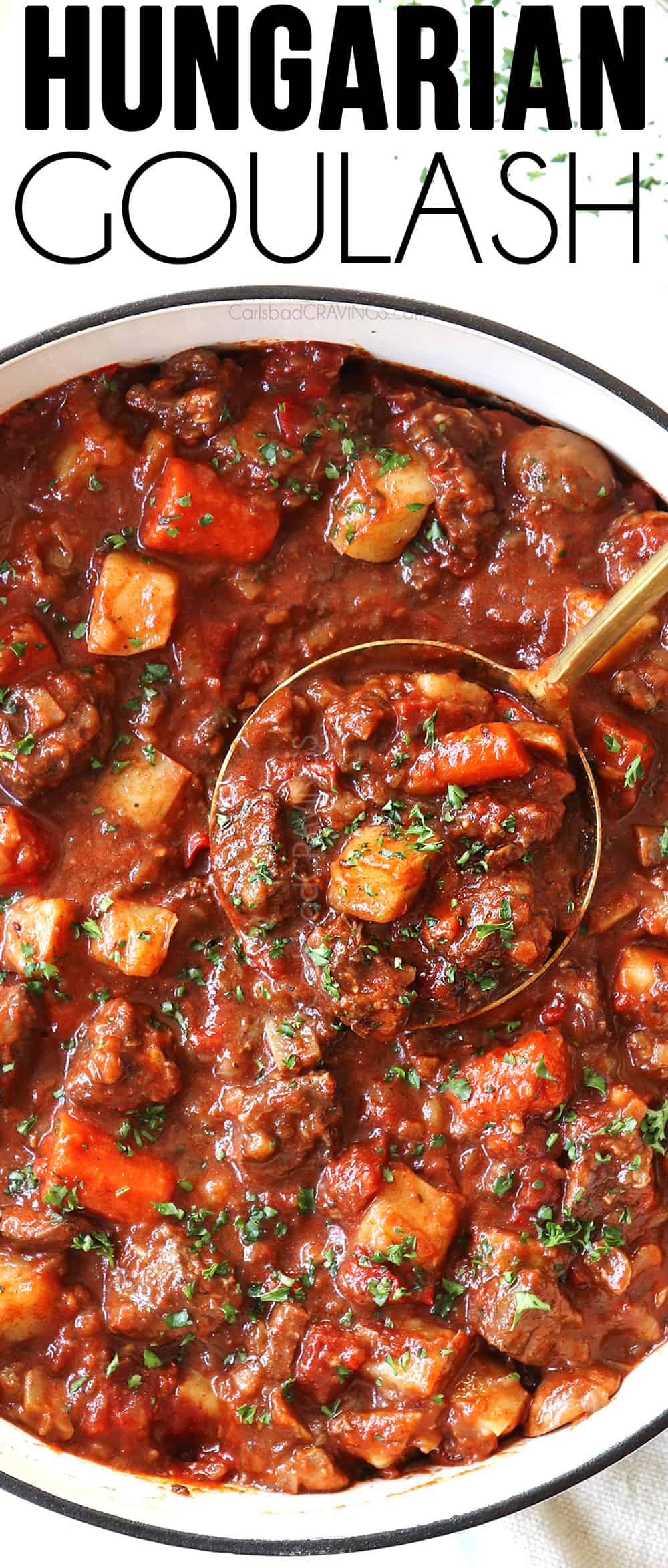
pin this recipe to save for later
What Is Goulash?
Goulash (Hungarian: gulyás) is one of the national dishes of Hungary. It is a beef and vegetable soup made with tender chunks of beef (neck or shoulder), peppers, onions, and garlic stewed in a rich broth seasoned with plenty of quintessential sweet paprika. Thicker style Goulash recipes like you see here today, are more accurately referred to as Pörkölt. At most, you'll find mushrooms, carrots, potatoes, bell peppers, and tomatoes. The peppers, tomatoes and potatoes are post-16th century additions, but a common addition today.
Hungarian Goulash varies from household to household; some recipes also include carrots, mushrooms, celery, turnips and/or parsnips, some recipes are more soup-like while others are thick and meaty, but they all include a generous amount of sweet paprika, caraway seeds and onions– the essential building blocks for a proper Goulash.
Goulash didn't start out as the hearty, richly red stew we all know and love today, but once paprika was introduced in the 1400s, it became a staple ingredient. Sweet paprika made of red bell peppers (not basic, smoked or hot paprika), adds the signature vibrant, sweet, warming notes and the caraway adds balancing nutty, lemon, peppery, anise notes. For this Goulash recipe, I used a full ¼ cup of sweet paprika, 2 large onions (about 2 pounds), 6 garlic cloves and 2 teaspoons caraway seeds. These amounts may seem excessive, but they are true to authentic Hungarian Goulash recipes and what build and meld together to create the incredibly rich, flavorful, complex broth that thickens as it slow cooks and reduces for hours.
The finishing touch in many Goulash recipes is sour cream. Stir it directly into the Goulash or as the crowning dollop on your plate served over a bed of csipetke (pinched egg noodles).
Where does goulash come from?
Goulash dates back to 9th century Hungary. During that time, Hungary was the home to massive herds of cattle that herdsman drove to Europe's biggest cattle markets from Vienna to Nuremberg. To feed themselves along the journey, the herdsman would claim the leanest cattle to butcher along the way.
They would spice, cook and dehydrate the beef and store it in a bag made from sheep's stomach. This created a portable meal that only needed water to rehydrate, and could be supplemented with ingredients found along the way or carried in saddlebags such as onions, cured bacon, or lard. The stew was then cooked over cast-iron cauldrons over an open fire until rich and tender. The portable nature of Hungarian Goulash made it extremely popular and soon it spread to other countries, becoming the peasant dish of the masses.
In the 15th century, peppers arrived from America to Hungary. The Hungarians dried, crushed, and made them into paprika and soon paprika became the quintessential, signature spice of Goulash. By the late 17th century, Goulash was beloved by most of Eastern Europe, but it wasn't until the early 1800s during the split of the Austro-Hungarian empire, that Hungarians declared Goulash their national dish as a way to distinguish themselves from their Austrian oppressors. Today, Goulash is just as beloved in Hungary and around the world.
What doeS Goulash Mean?
Goulash originates from the Hungariangulyás meaning "herdsman" or "cowboy," a nod to the herdsman who invented the portable, dehydrated stew. Over time, the dish becamegulyáshús, which translates to "goulash meat," meaning, a meat dish prepared by herdsmen. Today,gulyás refers both to the herdsmen, and to the soup.
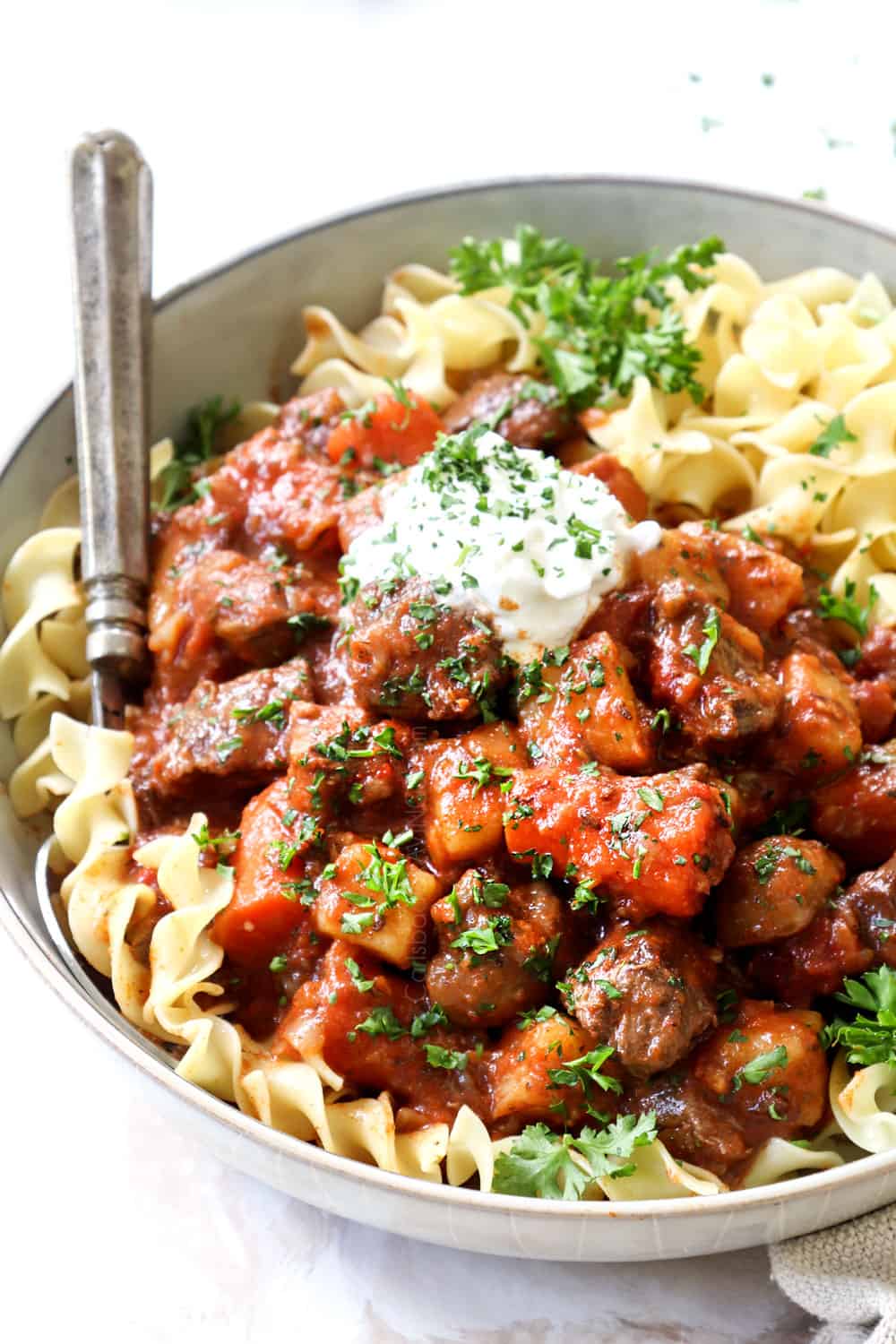
GOULASH OUTSIDE OF HUNGARY:
Hungarian Goulash is the mother of all Goulash recipes, even our macaroni studded American Goulash finds its roots in the famous national dish. Over the centuries, Goulash was embraced all over Europe, and eventually the world, even a far as the Philippines! Each country has adopted their own unique version.
Here are some varieties of Goulash from different countries to inspire your own, all of which still include Hungarian paprika:
- Austria: Austrians enjoy Wiener Saftgulasch,which loosely translates to "Viennese gravy goulash." It is aptly named because Viennese-style goulash consists of tender beef and onions without any other added vegetables. The beef is coated in a thick, dark, and smooth gravy that reduces and thickens over the slow cooking time.
- Czech Republic: you will find český guláš (Czech goulash) or hovězí guláš (beef goulash) in the Czech Republic. It's a thick stew also made with beef, onions and spices without additional vegetables. "Guláš" boasts a similar flavor profile to Hungarian Goulash but does not include other vegetables. It is often served topped with sliced onion and a side of simple boiled dumplings accompanied by Pilsner beer, the Czech drink of choice.
- Croatia: Croatian "Gulaš" is often made with venison or boar instead of beef with the addition of sliced or shredded carrots and mushrooms. It is traditional served over a bed of polenta.
- Germany: Beef Goulash (Rindergulasch), Venison Goulash (Wildschweingulasch), Pork Goulash (Schweinegulasch) and Wild Boar Goulash (Wildschweingulasch) are all popular in Germany! German Goulash omits the potatoes and replaces some of the broth with red wine. In northern Germany, it's often served over boiled potatoes. In southern German, it is served with Spätzle, a homemade noodle.
- Romania: includes Transylvania which was once part of the Austro-Hungarian empire so its Goulash is very similar to Hungary's. Romanian Goulash also includes beef or pork, onions, bell peppers, carrots, tomatoes and sour cream. In some areas of Romania, sauerkraut is added. It is served over Romanian polenta, dumplings or pasta.
- Serbia: Serbian Goulash is also very similar to Hungarian Goulash with the inclusion of vegetables but usually made with lamb or pork instead of beef. It can also boast a different flavor profile with the inclusion of chili pepper and cinnamon. It is typically served over mashed potatoes or pasta.
- North America: Goulash in America is more like hamburger helper than a stew. It first showed up in North American cookbooks around 1914, made with elbow macaroni, ground beef and canned tomato sauce.
What is the difference between Hungarian Goulash and American Goulash?
Hungarian Goulash and American Goulash are completely different, the only similarity they share is the rich tomato infused sauce. Hungarian Goulash is basically a simple beef stew characterized by the sweet paprika, caraway seed flavor profile which is sweeter and brighter than traditional stew you are used to. American Goulash, on the other hand, is an elbow macaroni loaded with ground beef and cheddar cheese with a tomato-based sauce, more like Hamburger Helper.
Hungarian Goulash Recipe
Now onto the main event! You guys, I am IN LOVE with this recipe. This Hungarian Goulash is a comforting classic waiting to become a new family favorite! It combines the comfort of rustic cooking with complex layers of flavor that will have everyone swooning. While this recipe might not be 100% authentic Goulash eaten in 9th century Budapest by Hungarian herdsmen, it comes pretty close. Here's why you'll love it:
- This recipe is so easy because the oven does most of the work!This Goulash recipe is made by searing the beef and sautéing the onions on the stovetop, then dumping in the rest of the ingredients and transferring the dish to the oven to braise to fall apart tender perfection. The oven method makes for a prep and forget meal that cooks the beef and vegetables evenly every time.
- It's a meal-in-one. This recipe also makes dinnertime a breeze because it's practically a meal-in-one loaded with protein and veggies. You can skip the sides all together or serve it with a no-fuss simple green salad and crusty bread.
- The exotic flavor will have your entire family swooning over the Goulash – mine was. Hungarian Goulash is seasoned with signature sweet Hungarian paprika and caraway seeds along with a bevy of hand-picked spices which infuse the beef and vegetables with sweet red bell pepper flavorings and bright, lemon, peppery notes. It's magic.
- This Goulash recipe is versatile, make it our own! Although you'll want to stick to the seasonings, you can customize the vegetables in this recipe to suite your family tastes.
- This big pot of Goulash is always a crowd pleaser. There simply isn't anything more comforting than a big bowl of hearty Goulash bursting with tender beef, potatoes and carrots swimming in luscious beef and tomato-infused sauce. It's like a warm blanket that warms you from the inside out with every heaping slurpful. Even your pickiest eater will be clamoring for more!
- It makes a large quantity. This easy recipe makes a hearty pot which feeds the entire family with tantalizing leftovers to spare at the fraction of the price of dining out.
- This Goulash recipe is perfect for make ahead meals, meal prep or freezer meals. This is one of those unique recipes that tastes even better the next day, so bring on the make-ahead-meal to pull it out for those busy nights ahead!
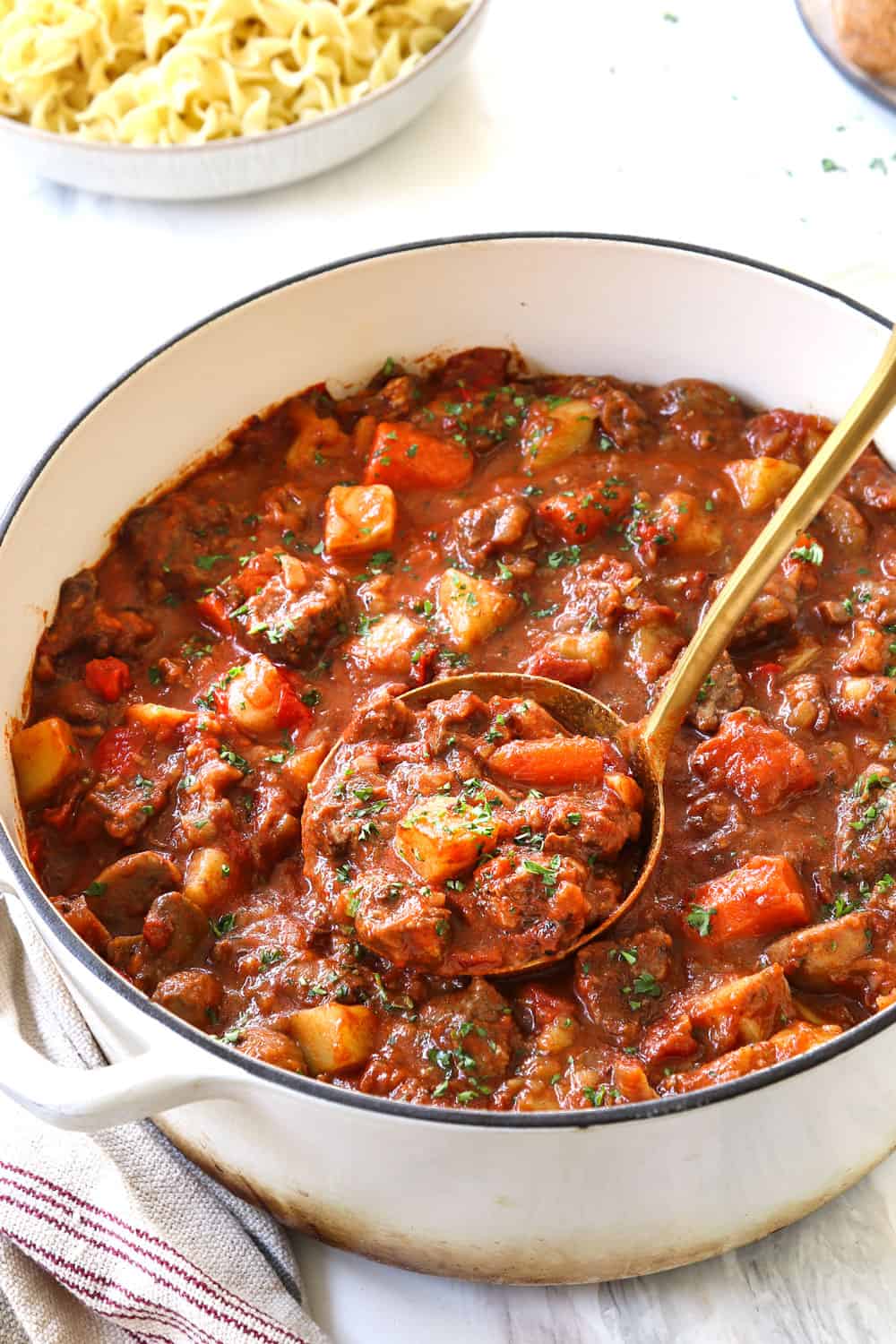
WHAT KIND OF BEEF IS best for Goulash?
Boneless chuck is the best cut of beef for Hungarian Goulash. It boasts a succulent, beefy flavor and melt-in-your mouth texture due to its rich marbling. It isguaranteed to become fall apart tender when cooked long enough.
You can purchase a single piece from your butcher (I like Costco) and chop it yourself. This ensures every bite is the same cut of beef (imagine that!) and is (roughly) the same size so they cook evenly.
CAN I USE STEW MEAT?
While you might assume "stew meat" is the best cut for Goulash, it's NOT! Stew meat is a hodgepodge of different cuts of meat all packed together. This creates a problem because not all cuts of meat cook the same due to their meat to fat ratio so you are left with tender bites, tough bites and rubbery bites – all in the same dish!
HOW DO YOU MAKE the BEEF TENDER?
In order for this Hungarian Goulash recipe to be a success, the beef MUST be tender. This requires the right cut of beef, searing the beef and cooking the beef long enough.
- Use the right cut of beef. As previously discussed, boneless chuck roast will deliver fall apart tender results due to its rich marbling. If you choose another cut of beef, be aware it might not deliver as spectacularly tender results.
- Sear the beef. Searing seals in the juices so the beef doesn't dry out when cooked for an extended period of time. The caramelized crust achieved by the Maillard reaction also delivers a rich, depth of flavor that can't be achieved any other way.
- Cook the beef until tender. I learned this trick from my Mom's Crazy Tender Pot Roast. If your beef isn't crazy tender, then cook on! It just means the proteins needs more time to break down and tenderize. Even 30 more minutes can make the world of difference between an "okay" beef and melt-in-your-mouth beef.
goulash Recipe Ingredients
This Goulash recipe boasts many of the same ingredients you find in beef stew. You will need:
- Beef chuck roast: select a small beef chuck roast without a lot of fat. If your roast is more or less than 2 ½ pounds, just use more or less broth, or freeze the excess for another day.
- Sweet paprika: is a MUST for this recipe. It cannot be substituted for regular, smoked or hot paprika. You may be able to find it at your grocery store but more likely Amazon is the way to go.
- Caraway seeds: are nutty, slightly bittersweet with hints of citrus, pepper, and anise (mild licorice). You should be able to find caraway seeds at the grocery store or always on Amazon. If you only can get your hands on the ground version, only use 1 ½ teaspoons because is more potent.
- Thyme: is earthy and minty, with floral, sweet and peppery notes. Use dried thyme because it is more potent than fresh thyme when cooked for long period of thyme.
- Bay leaves: have a sharp, slightly bitter taste that complement the sweet paprika and keep the stew from being too heavy.
- Salt and pepper:The Goulash needs to be well seasoned because vegetables by themselves are very bland. Salt and pepper awaken the flavors. If you feel like the finished dish is missing something, it is probably salt or pepper and can easily be remedied with a few shakes
- Potatoes: not all potatoes are created equal. For soups and stews that cook for a long time, you need low starch waxy potatoes such as red potatoes, Yukon, new potatoes or fingerling potatoes. Waxy potatoes do not absorb moisture while they cook so they retain their shape despite extended high heat. Starchy potatoes, such as russet potatoes, should be avoided because they develop a mealy texture and are likely to fall apart.
- Carrots: are optional as they are not found in authentic Hungarian Goulash recipes, but I think you'll love the addition! Cut them larger, into about 1 1/2-inch pieces so the hold up against the long cooking time.
- Red bell pepper: enhances the sweet paprika. Chop the bell peppers into ½-inch pieces.
- Onions: use 2 large onions (about 2 pounds). I know it sounds like a lot, but they cook down and boast fabulous flavor.
- Butter:the onions and mushrooms are sautéed in both butter and olive oil for extra flavor. Use unsalted butter so we can control the salt.
- Vegetable oil: you MUST use a high smoking oil such as vegetable oil and not olive oil to sear the beef. Reserve the olive oil for sautéing the onions.
- Garlic:flavors the dish without overpowering it.
- Fire roasted diced tomatoes: are tomatoes that have been roasted which gives them a complex smokiness and removes the acidic bite. Fire roasted tomatoes are located next to the traditional diced tomatoes – just make sure you purchase the ones without any added seasonings. You can use plain diced tomatoes if you can't locate fire roasted.
- Beef broth: is a must for Hungarian Goulash to deliver that rich, beefy flavor. Please use reduced sodium beef broth so we have the luxury of adding concentrated beef bouillon. Pleasedo not use chicken broth or vegetable broth because they not have the same richness of beef broth.
- Beef bouillon: is a secret ingredient that adds a complex depth of flavor that can't be beat. You can use granulated beef bouillon, beef bouillon cubes or better than bouillon. If using cubes, crush and add directly to the broth, don't dissolve in water first.
- Worcestershire sauce: is a flavor bomb all packed into one bottle. Just a splash deepens the complexity of the dish with its intense umami flavor from the soy mingled with sour from tamarind and vinegar, sweetness from molasses and sugar, and dimension from the cloves, celery seed, and chili pepper extract.
- Tomato paste: adds rich, concentrated tomato flavor. I save unused tomato paste by flash freezing it by the tablespoon on parchment paper, then cut out the individual tablespoons, wrap them up, then store together in a sealable bag in the freezer.
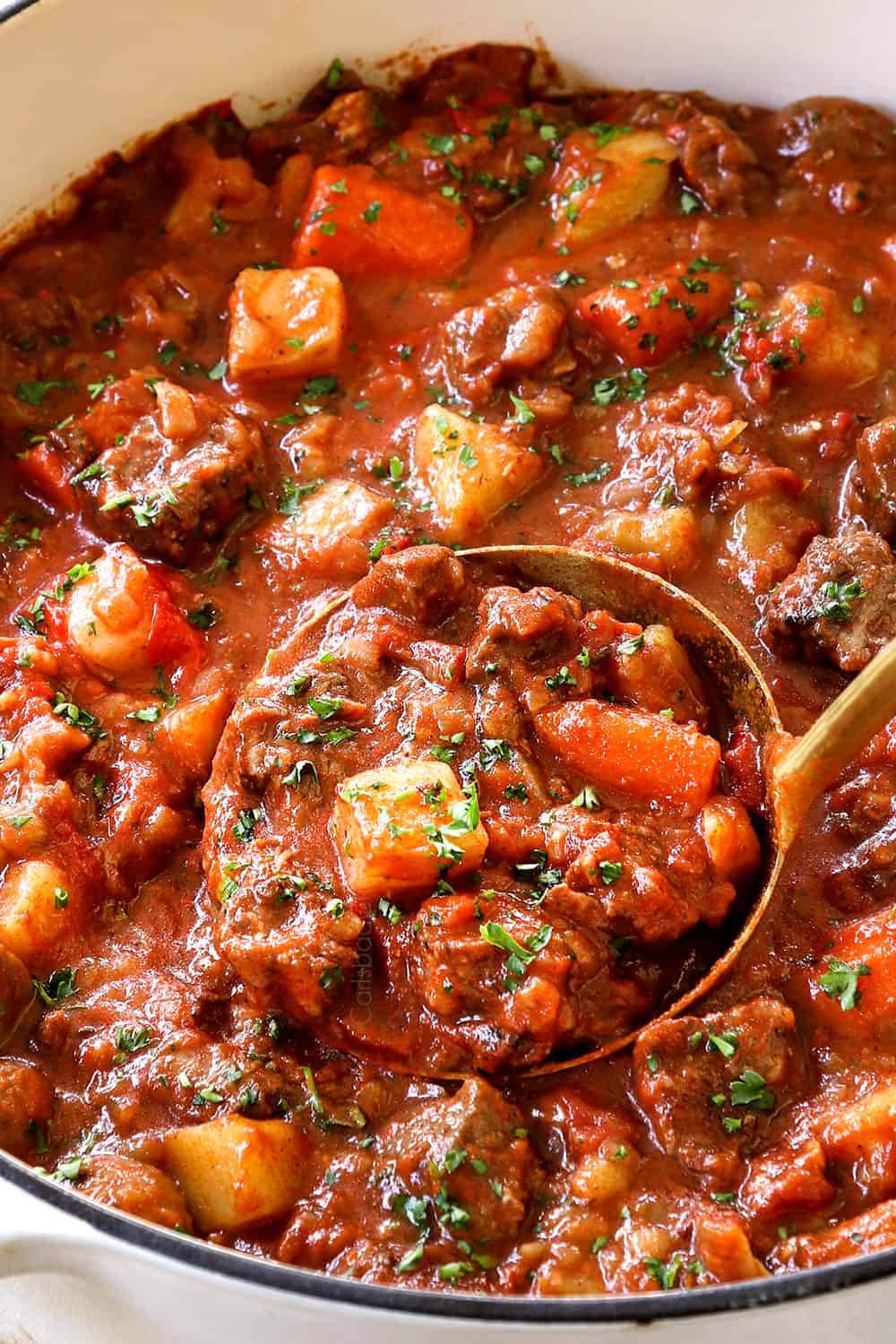
What is Hungarian Paprika?
Paprika is made from the finely ground skins and flesh of red peppers to create the iconic bright red powder. It is categorized by mild/basic, sweet, hot, and smoked, with a few other variations somewhere in between, depending on which red peppers are used. For this recipe, you must use Hungarian sweet paprika, often labeled "sweet paprika." Do NOT use smoked or hot paprika! Sweet paprika is made of sweet red bell peppers so it doesn't have any heat. Instead, it's bright, sweet, fruity and peppery.
Can I just use paprika?
The paprika that you see in the grocery store that is simply labeled, "paprika" is guaranteed to be basic, mild paprika, with a low-intensity pepper flavor without much heat or sweetness. It is the least assertive in flavor of all the varieties of paprika and will NOT deliver the signature flavor of Hungarian Goulash. To achieve the signature flavor, you must use sweet Hungarian paprika or sweet paprika for its pungent pepper flavor and sweetness.
What can i substitute for caraway seeds?
Caraway seeds are one of my favorite seasonings. I don't use them a lot in recipes I post because it's not a common pantry ingredient, but I do think it's worth stocking. The flavor of caraway cannot be directly replicated, but the best substitution is half fennel seeds and half oregano. So, for this Hungarian Goulash recipe, use 1 teaspoon fennel seeds and 1 teaspoon dried oregano.
Hungarian Goulash RECIPE Variations
Goulash recipes vary widely even within Hungary! Now that you're familiar with the basic ingredients, here are some variations to inspire your own creativity, thanks to Wikipedia!:
- Székely Gulyás: omit the potatoes and add sauerkraut and sour cream.
- Mock Gulyás , also calledHamisgulyás, (Fake Goulash): substitute beef bones for the meat and add vegetables.
- Bean Gulyás: omit the potatoes and the caraway seeds. Use kidney beans instead.
- Csángó Gulyás: add sauerkraut instead of potatoes.
- Betyár Gulyás : use smoked beef or smoked pork for the meat.
- Likócsi Pork Gulyás: use pork and thin vermicelli in the Goulash instead of potatoes. Season with a splash of fresh lemon juice.
- Mutton Gulyás orBirkagulyás: substitute the beef with mutton (older sheep meat) and red wine.
- Paprikás krumpli: substitute the beef with spicy sausage and bacon.
More Goulash Recipe variations
Here are a few more recipe variations that aren't authentic. Remember, this is YOUR Goulash recipe, make it your own!
- Use ground beef: swap the beef chuck roast for ground beef, similar to Hamburger Soup and use smaller carrots Brown the beef and onions then add all of the ingredients including the potatoes and simmer for 30 minutes or until the carrots and potatoes at the tender.
- Make it creamy: Hungarian Goulash is often served with a dollop of sour cream mixed directly into the stew; or you can add a dollop to each bowl. You can also stir in ¼ cup heavy cream during the last several minutes of cooking time, much like in authentic Bolognese sauce. If you plan on freezing the dish, however, you'll want to omit the heavy cream and add the sour cream to individual servings.
- Make it spicy: this Goulash recipe is fantastically flavorful but is not spicy. If you would like a kick of heat, add 1/4-½ teaspoon red pepper flakes.
- Carrots: I added carrots to the recipe, which are not traditional components of authentic Hungarian Goulash because I LOVE carrots with potatoes. So, take them or leave them for a more or less authentic experience. If you omit the carrots, you will need less broth- just enough to cover the contents of the pot.
- Add vegetables: add any of your favorite veggies such as parsnips, turnips sweet potatoes, butternut squash, etc.
- Add rice: add 1 cup long grain white rice (I recommend basmati for the best texture) the last 10-12 minutes of cooking (must be simmered on the stove). You will need to add additional broth to accommodate the rice.
- Add pasta: add short pasta noodles to the pot while simmering on the stove the last 10 minute or so. Again, add additional broth to the Dutch oven as needed to compensate for the pasta.
- Roasted sweet red bell peppers: instead of sautéing one red bell pepper, try adding a drained, blended or roughly chopped jar of roasted sweet bell peppers instead.
- Consistency: Hungarian Goulash ranges from thick to brothy. For a soupier version, increase the broth to 4 cups.
- Beer: While researching Hungarian Goulash, I found several recipes that use beer in place of some of the beef broth. You are welcome to replace part of the beef broth with a bottle of beer, if desired.
How to Make Goulash
Don't let the thought of making homemade goulash intimidate you! It's actually an incredibly simple process, but the stew does require about 3 hours to cook low and slow in the oven. Here are the basic steps to making this recipe at home:
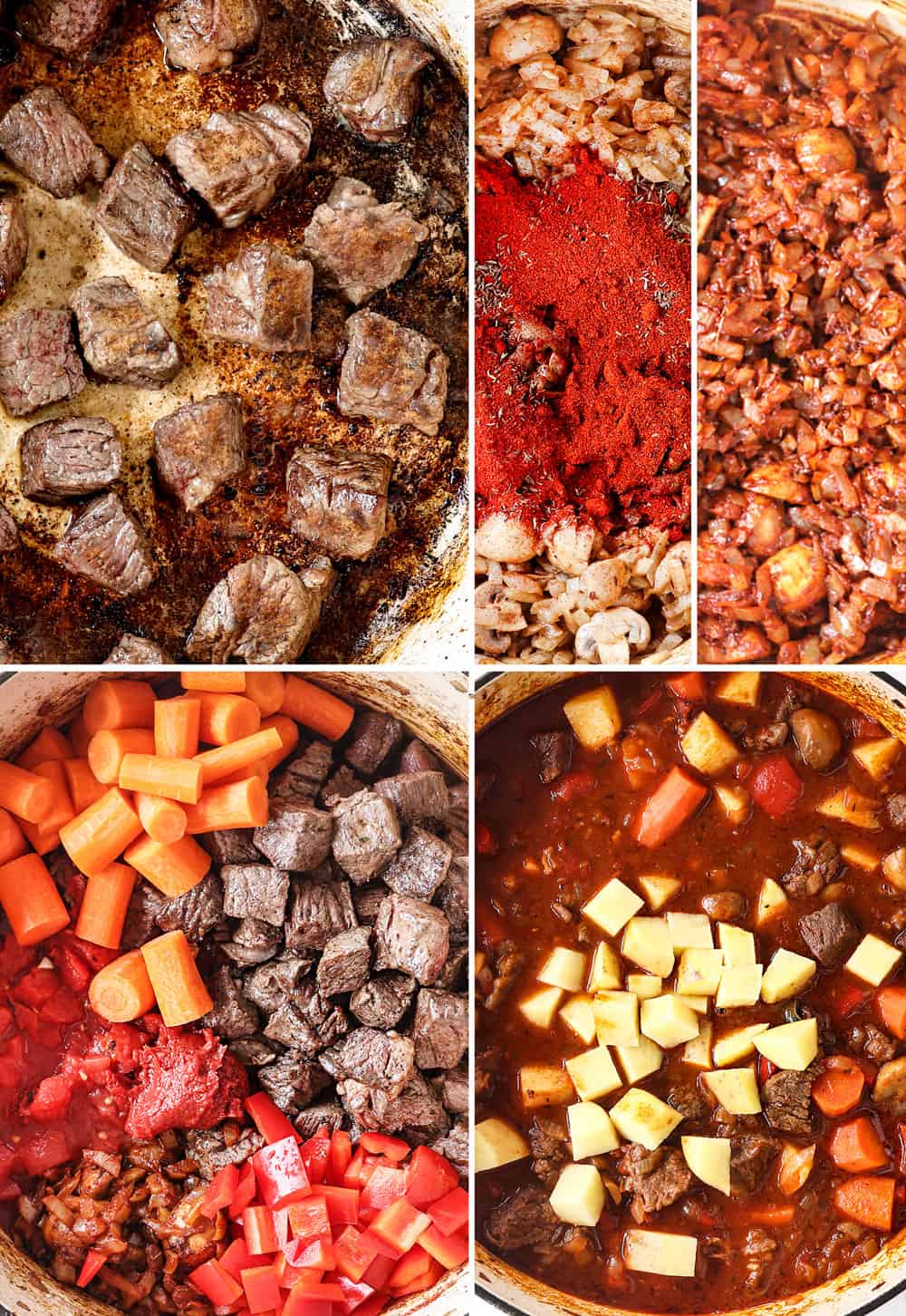
Step 1: Prepare the ingredients
Season the beef cubes with salt and pepper, then set aside and allow to come to room temperature while you chop the vegetables. This develops a more flavorful crust and helps the beef sear more evenly.
Step 2: sear the beef
For the best flavor and texture, sear the beef in two batches so it it can brown and not just steam, rotating the beef with tongs after it cooks for a few minutes on each side. You're not looking to cook the beef all the way through, but go for deeply browned, because color equals flavor! Transfer the beef to a plate but leave the drippings behind. These deeply flavorful drippings will add an extra oomph of flavor to the veggies and the entire dish.
STEP 2: Saute aromatics
Add some butter, onions and mushrooms, if using, to the drippings. Cook, stirring often, until onions are softened, about 10 minutes. We're not looking to brown the onions, (although they will soak up color from the drippings) but looking to soften them slowly to really caramelize and amp up the sweetness.
Once the onions are caramelized, add the garlic, sweet paprika, caraway seeds and thyme and sauté for 30 seconds. This blooms/unlocks the flavors.
Step 3: Assemble & cook the goulash
Add all remaining Goulash ingredients up to "add later" (diced tomatoes through bay leaves). The broth should barely cover the ingredients, if it doesn't, then add enough just to cover. Cover and cook on the stove or in the oven, adding the potatoes the last bit of cooking. I prefer the oven for even cooking without any babysitting, but the broth will reduce more and become thicker on the stove.
HOW DO YOU THICKEN GOULASH?
The consistency of the Goulash is a matter of personal preference and is easy to control. If you prefer your Hungarian Goulash thicker like stew, you may need to thicken it at the end of cooking with a cornstarch slurry. This is particularly applicable if you've cooked the Goulash in the oven. If that's the case, you will need to complete this step on the stove.
To make the slurry, whisk together 2 tablespoons cornstarch with ¼ beef broth or water until the cornstarch is completely dissolved. Slowly stir the slurry into the Goulash over low heat, then bring the stew to a simmer for 5-10 minutes, until thickened. If the dish thickens too much, then stir in additional broth.
How do you Thin Goulash?
If you've cooked the Goulash on the stove, it will reduce down more than in the oven and become thicker. If it's to thick for your liking, then stir in additional broth.
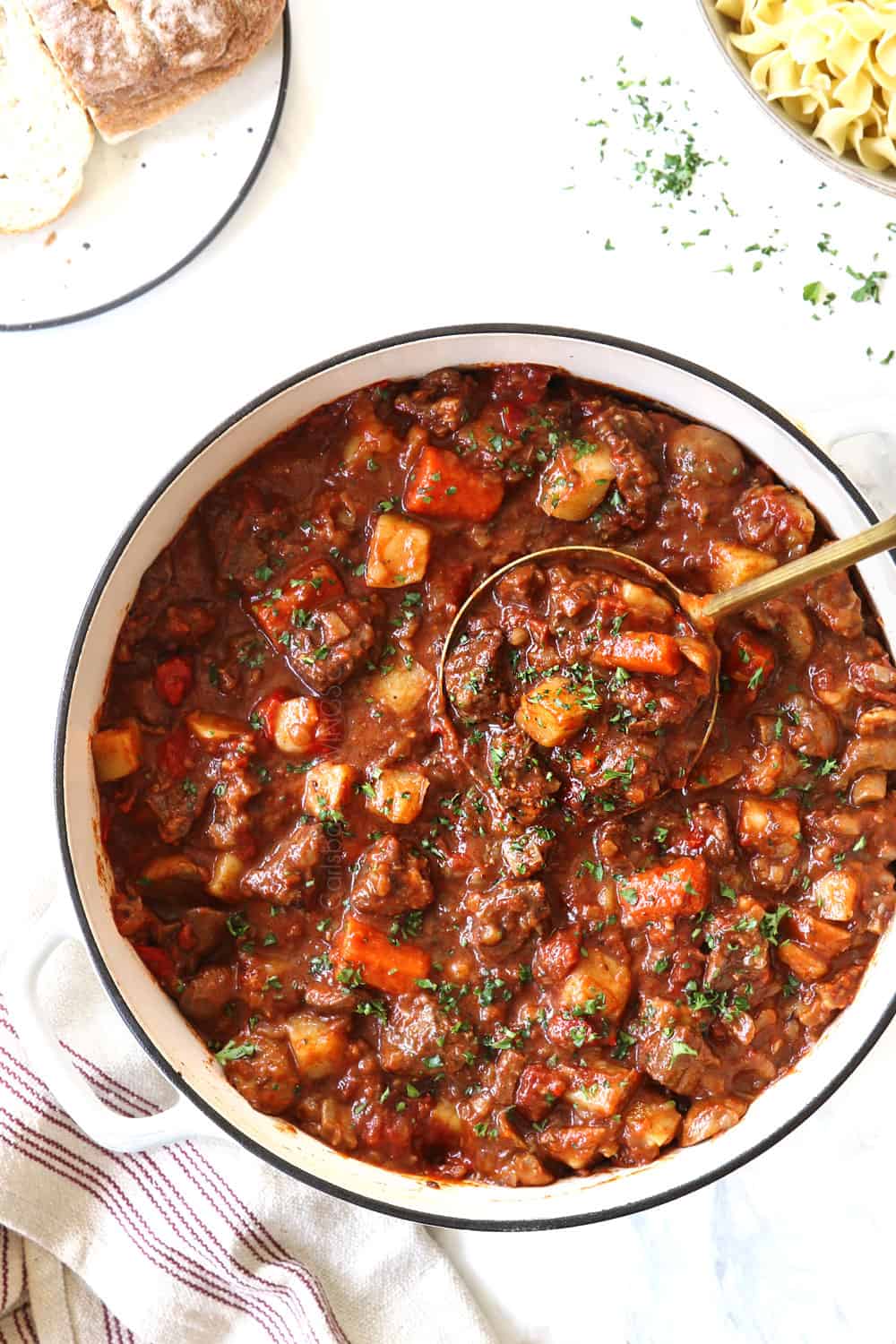
HOW TO SERVE HUNGARIAN GOULASH
Authentic Hungarian Goulash is served in shallow bowls over Nokedli, (little dumplings similar to spaetzle), or Csipetke (pinched egg noodles in the shape of a dumpling). Classic egg noodles are a great substitute if you can't get your hands on either one. Goulash is also tasty served over mashed potatoes (if omitting the potatoes in the dish) or polenta like they do in Romania.
Server your Goulash recipe with a dollop of sour cream and rye bread on the side with a generous sprinkling of fresh parsley.
What sides to serve with Goulash?
Now that we have the Goulash covered, let's talk sides. Since your meal already consists of a truly fantastic, hearty bowl of amazing flavor, sides can be minimal. Go with a big green salad and crusty bread or rye bread. For more involved, company worthy salads, I suggest Apple Salad, Strawberry Spinach Salad or Fall Salad. For fruit, try Perfect Fruit Salad in the spring/summer and Winter Fruit Salad in the Fall/Winter.
goulash recipe Tips and Tricks
- Use Hungarian sweet paprika! This will make or break your recipe as paprika varies widely in flavor and heat. For this recipe, you'll want to use only sweet paprika (this is the specific brand that I always use), which is easy to find on Amazon for just a few dollars. If you don't use sweet paprika, it not only will be missing the signature flavor, but the paprika will overpower and ruin the entire recipe.
- Add more or less broth. This Goulash recipe calls for 2 ½ cups beef broth but this can vary depending on whether or not you use carrots, mushrooms, size of your pot etc. If you are going for a hearty, meaty stew, add just enough broth to cover the pot contents, whether this is more or less than 2 ½ cups.
- Cook the Goulash long enough. Take the extra time to cook your meat properly, it really needs 2 ½ to 3 hours to become buttery tender. I tested this recipe after cooking for 2 hours in the oven and the beef was tender. I tested again after 3 hours and the beef was melt in your mouth tender. So, if you only have 2 hours, the recipe will still work, but for the most tender beef, cook on for guaranteed buttery tender beef.
- Remove excess fat from the chuck roast. Unlike a pot roast, you don't have the luxury of cutting away visible fat once cooked. Instead, you'll want to trim as much visible fat as possible from the cubes of beef before cooking to ensure every piece is tender and not chewy. You will also want to skim some of the fat of the top of the pot when you remove the finished dish from the oven.
- Don't skimp on the ingredients. The quantity of sweet paprika and onions in this recipe might seem excessive, but that is the Hungarian way! Don't skimp on the ingredient or you will miss out on the rich depth of the flavor that is out-of-this-world delicious!
Can this goulash recipe be made in a slow cooker?
Yes, this Hungarian Goulash recipe is fantastic to make in the crockpot instead of the oven! Follow the directions for searing the meat and browning the onions, then transfer all of the ingredients (including the potatoes) to the slow cooker. Cook on HIGH for 4 hours or LOW for 7 or 8.
The exact cooking time will depend on your cut of beef, exact size of beef and your particular slow cooker. Some crockpots cook hotter and therefore faster than others, so make sure you check your beef sooner if you have not made this Goulash recipe before. You will know the recipe is done when the beef is very tender.
MAKE AHEAD GOULASH Recipe
This Goulash recipe tastes even better the next day, so feel free to make it in its entirety and reheat when ready to serve. Alternatively, you can prep some of the ingredients in advance:
- Carrots: chop the carrots and place them in an airtight container days in advance. You can also chop the mushrooms but remember do NOT rinse them, simply brush them with a cloth.
- Potatoes: once you cut the potatoes, starch is released which will cause them to brown, so make sure you submerge them in water to prevent this discoloration. Simply place the potatoes in a bowl or airtight container, cover with water then cover with plastic wrap or a lid and refrigerate until ready to use.
- Beef: chop into 1" pieces the night before. You can even sear the beef the night before. Make sure your beef cools to room temperature before sealing in an airtight container or zip bag and placing in the refrigerator.
- Assemble: this makes for a hassle free, no fuss dinner! Follow the recipe up to cooking in the oven, adding all of the ingredients to the pot. Cover and transfer to the refrigerator until ready to cook. When ready to cook, bring to a simmer before transferring to the oven.
HOW DO I STORE goulash?
Once your Goulash has cooled to room temperature, cover and transfer to the refrigerator. Refrigerate for up to 4 days.
HOW DO I REHEAT goulash?
- Crockpot: heat on low for 1-2 hours, depending on how much you have left.
- Stove: heat over medium-low heat, stirring occasionally until the beef is heated through to 165 degrees F. This may take 20 minutes, so plan accordingly.
- Microwave: for smaller batches or individual servings, transfer Goulash to a microwave-safe dish, cover with a microwave-safe lid or paper towel. Microwave for 2 minutes, stir, then continue to microwave for 30-second intervals, if needed.
CAN I FREEZE this goulash recipe?
Yes, this Hungarian Goulash recipe freezes very well. To freeze:
- Cool: allow the Goulash to cool completely before freezing to preserve the integrity of the ingredients.
- Package:transfer to an airtight freezer safe container or freezer bag. You can even use sandwich size plastic bags for individual portions. Squeeze out any excess air to prevent freezer burn and label
- Freeze: for up to 3 months.
- Thaw/Reheat: thaw overnight in the refrigerator then reheat in the microwave, crockpot or stove according to aforementioned instructions.
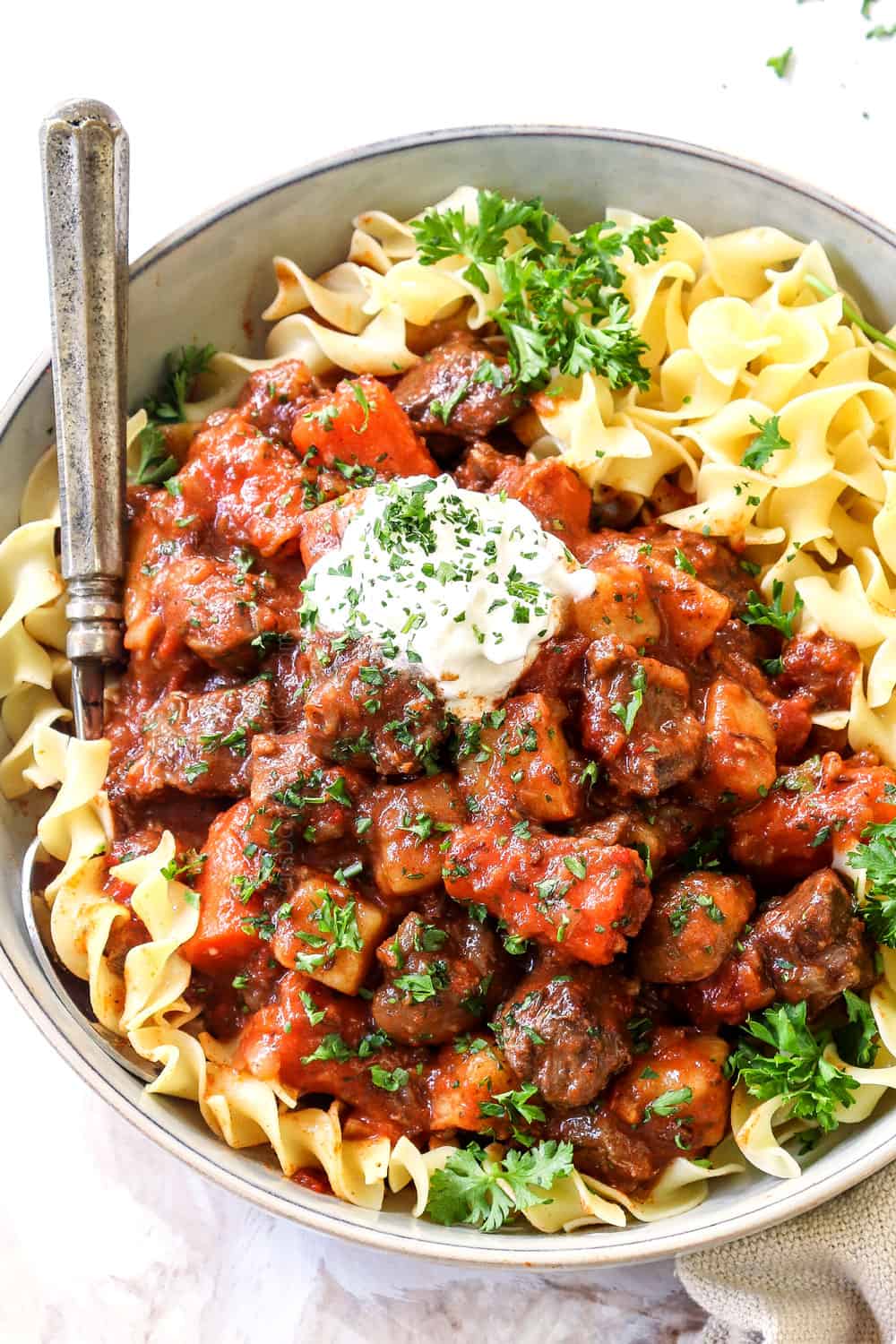
Save This Recipe To Your Recipe Box
You can now create an account on our site and save your favorite recipes all in one place!
Goulash
- 2.5 pounds boneless chuck roast trimmed of excess fat and cut into 1-inch cubes
- 1 tsp EACH salt, pepper
- 2 tablespoons vegetable oil
- 2 tablespoons unsalted butter
- 2 large yellow onions, diced
- 10 ounces white mushrooms, halved, quartered if large (optional)
- 6 garlic cloves, minced
- ¼ cup sweet paprika (do NOT use basic, hot or smoked paprika)
- 2 teaspoons caraway seeds (may sub 1 tsp EACH fennel seeds, dried oregano)
- 1 teaspoon dried thyme
- 1 ½ cups carrots, cut into 1 1/2-inch pieces (optional)
- 1 red bell pepper, chopped into ½-inch pieces
- 1 14 ounce can fire roasted diced tomatoes (don't drain)
- 3 tablespoons tomato paste
- 1 tablespoon Worcestershire sauce
- 1 tablespoon beef bouillon
- 2 ½-3 cups low-sodium beef broth
- 2 bay leaves
Add later
- 3 medium Yukon Gold potatoes, chopped into ½-inch cubes
- ¼ cups low-sodium beef broth (optional for thickening if desired)
- 2 tablespoons cornstarch (optional for thickening if desired)
For serving
- nokedli, csipetke or egg noodles
- sour cream
- salt and pepper to taste
- freshly chopped parsley (optional)
-
While meat is still on the cutting board, toss it with 1 teaspoon salt and 1 teaspoon pepper. Let rest while you chop/gather the rest of your ingredients.
-
Preheat oven to 325 degrees F, if using.
-
Heat 1 tablespoon vegetable oil in a large Dutch oven over medium high heat. Add half of the beef and cook until seared on all sides; transfer to a plate. Repeat with remaining beef.
-
Lower heat to medium and add butter, a drizzle of olive oil, onions and mushrooms (if using). Cook, stirring often, until onions are softened, about 10 minutes. Add a drizzle of olive oil if the vegetables become too dry.
-
Add garlic, sweet paprika, caraway seeds and thyme and sauté for 30 seconds. Add all remaining Goulash ingredients up to "add later" (carrots through bay leaves). The broth should barely cover the ingredients, you may need more or less depending on your pot and if you omit the carrots/mushrooms.
OVEN METHOD
-
Bring the pot to a simmer, cover, then transfer to the 325 degree oven. Cook for 1 hour, then remove the pot from the oven. Add the potatoes if using. Cover and return to the oven and cook for an additional 1 ½-2 hours, until beef and potatoes are very tender.
-
Remove the dish from the oven to the stove. If you would like a thicker Goulash, make a cornstarch slurry by mixing 2 tablespoons cornstarch with ¼ cup of cold beef broth or water until the cornstarch is completely dissolved. Slowly whisk into the Goulash over low heat. Bring to a simmer for 5-10 minutes until thickened.
-
Taste for seasonings and adjust with salt and pepper if needed. Serve each bowl over csipetke (or our American egg noodles) garnished with a dollop of sour cream, and parsley if desired.
STOVE METHOD
-
Bring the pot to a simmer, cover, and continue to simmer for 2-3 hours, stirring occasionally and replacing the lid. Add the potatoes, if using, the last 30 minutes of cooking. More broth will evaporate on the stove, so be prepared to add additional broth as needed.
-
If you would like a thicker Goulash once the beef is tender, make a cornstarch slurry by mixing 2 tablespoons cornstarch with ¼ cup of cold beef broth or water until the cornstarch is completely dissolved. Slowly whisk into the Goulash over low heat. Bring to a simmer for 5-10 minutes until thickened.
-
Serve each bowl over csipetke (or our American egg noodles) garnished with a dollop of sour cream, and parsley if desired.
CROCKPOT METHOD
-
Follow the directions for searing the meat, browning the onions, and sautéing the aromatics, then transfer all of the ingredients (including the potatoes) to a 6 quart (or larger) slow cooker.
-
Cook on HIGH for 3-4 hours or on LOW for 7 or 8, until the beef is very tender.
-
If you would like a thicker Goulash once the beef is tender, make a cornstarch slurry by mixing 2 tablespoons cornstarch with ¼ cup of cold beef broth or water until the cornstarch is completely dissolved. Whisk it into the Goulash and cook on HIGH for 30 minutes.
-
Taste for seasonings and adjust with salt and pepper if needed. Serve each bowl over csipetke (or our American egg noodles) garnished with a dollop of sour cream, and parsley if desired.
- Sweet paprika: is a MUST for this recipe. It cannot be substituted for mild/basic, smoked or hot paprika. You may be able to find it at your grocery store but more likely Amazon is the way to go (this is the specific brand that I always use).
- Caraway seeds: are nutty, slightly bittersweet with hints of citrus, pepper, and anise (mild licorice). You should be able to find caraway seeds at the grocery store or always on Amazon. If you only can get your hands on ground caraway, only use 1 ½ teaspoons because is more potent. The best substitution for caraway in this recipe is 1 teaspoon fennel seeds and 1 teaspoon dried oregano.
- Beef bouillon: is a secret ingredient that adds a complex depth of flavor that can't be beat. You can use granulated beef bouillon, beef bouillon cubes or better than bouillon. If using cubes, crush and add directly to the broth, don't dissolve in water first.
MAKE AHEAD GOULASH
This Goulash recipe tastes even better the next day, so feel free to make it in its entirety and reheat when ready to serve. Alternatively, you can prep some of the ingredients in advance:
- Carrots: chop the carrots and place them in an airtight container days in advance. You can also chop the mushrooms but remember do NOT rinse them, simply brush them with a cloth.
- Potatoes: once you cut the potatoes, starch is released which will cause them to brown, so make sure you submerge them in water to prevent this discoloration. Simply place the potatoes in a bowl or airtight container, cover with water then cover with plastic wrap or a lid and refrigerate until ready to use.
- Beef: chop into 1" pieces the night before. You can even sear the beef the night before. Make sure your beef cools to room temperature before sealing in an airtight container or zip bag and placing in the refrigerator.
- Assemble: this makes for a hassle free, no fuss dinner! Follow the recipe up to cooking in the oven, adding all of the ingredients to the pot. Cover and transfer to the refrigerator until ready to cook. When ready to cook, bring to a simmer before transferring to the oven.
HOW to store and reheat Goulash
- To store: let Goulash cool to room temperature, cover and transfer to the refrigerator. Refrigerate for up to 4 days.
- To freeze: transfer cooled Goulash to an airtight freezer safe container or freezer bag. Squeeze out any excess air to prevent freezer burn. Freeze for up to 3 months. Thaw overnight in the refrigerator before reheating.
- To reheat in the crockpot: heat on low for 1-2 hours, depending on how much you have left.
- To reheat on the stove: heat over medium-low heat, stirring occasionally until the beef is heated through to 165 degrees F. This may take 20 minutes, so plan accordingly.
- To reheat in the microwave: transfer Goulash to a microwave-safe dish, cover with a microwave-safe lid or paper towel. Microwave for 2 minutes, stir, then continue to microwave for 30-second intervals, if needed.

Did You Make This Recipe?
Tag @CarlsbadCravings and Use #CarlsbadCravngs
Leave a Review, I Always Love Hearing From You!
Source: https://carlsbadcravings.com/hungarian-goulash/
0 Response to "How to Tell if Roast Beef Is Done in Crockpot"
Post a Comment